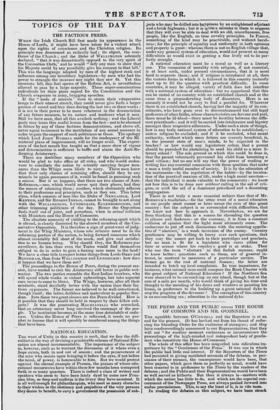TOPICS OF THE DAY -
• THE -FACTIOUS PEERS.
WTIBN the Irish Church Bill first made its appearance in the House of Lords, it might have been taken for a violent attack upon the rights of conscience and the Christian religion. Its principle was denounced as radically bad ; its object, the over- throw of the Church ; and the Duke of WELLINGTON solemnly declared, "that it was diametrically opposed to the very spirit of
the Coronation Oath," and he would "defy any man to show that his Majesty could by any possibility give his consent to that bill." This was the language adopted by men of the highest rank and influence among our hereditary legislators—by men who had the power to strangle the measure any night they saw fit. Yet this atrocious bill, this foul spawn of the Reform Act, is nevertheless ' allowed to pass by a large majority. These super-conscientious individuals let their pious regard for the Constitution and the Church evaporate in noisy, bragging speeches. – If the " lords of misrule" were to strain their vituperative lungs to their utmost stretch, they could never give forth a larger portion of sound and fury than during the last two or three weeks : it is not in their power to be more vehement in the denunciation of any future measure, be its nature and tendency what it may. Still we have seen, that all this availeth nothing : and the Liberal party may learn this useful lesson from the fact—not tobe alarmed in future by any of these factious demonstrations, and above all,
never again to consent to the mutilation of any sound measure in eider to gain the support of such politicians as these. The apology which Lord JOHN RUSSELL made for the inadequacy of the Mi nisterial plans of improvement, will no longer avail. The experi- ence of the last month has taught us that a mere show of vinous and determination is sufficient to baffle and alarm the And-Re- forming Aristocracy.
There are doubtless many members of the Opposition who would be glad to take office at all risks, and who would endea- vour to conciliate the nation by actually carrying larger mea- sures than the Whigs seem likely to carry. These men know that their only chance of retaining office, should they by any miracle be again possessors of it; would be found in pursuing such
a course. • But it so happens, that there are two classes of Anti- Reformers,—one, which would never quit their places, had they
the means of retaining them ; another, which obstinately adheres
to their professions and principles, such as they are. This latter class, which consists of men like the Duke of NEWCASTLE, Lord KENYON, and Sir ROBETtt INGLIS, cannot be brought to act along with. the WELLINGTONS, LYNDHURSTS, ELLENBOROUGHS, and other trimming politicians of the day. Hence the Opposition finds itself out of Joint, and powerless, when in actual collision with Ministers and the House of Commons.
The absolute necessity of yielding to the reforming spirit which • is abroad, is clearly discerned by the shrewd members of the Con- .servative Opposition. It is therefore a sign of great want of judg- ment in the Whig Ministers, whose sole reliance must be-in the reforming portion of the nation, to bring forward measures which -almost invariably fall short of the mark, and give real satisfac-
-tion to no human being. Why should they, the Reformers par excellence, do less than even the Tories would find themselves obliged to do in order to gain a footing once more in the land? We. have a clear title to expect better things from Lords GREY and BROUGHAM, than from WELLINGTON and LYNDHURST : how does „ it happen that we have them not?
The proceedings in the House of Peers, during the present ses- sion, have tended to sink the Aristocracy still lower in public esti- ; nation. The two parties resemble the East Indian brawlers, who i will spend whole weeks in violent .upbraidings, but take especial
' care never to come to blows. The Whigs, however, after all their misdeeds, stand decidedly better with the nation than their fac- tious opponents. The former are believed to be well-intentioned, though timid ; the latter, faithless and malevolent to popular free- dom. Into these two great classes are the Peers divided. How is it possible that they should be held in respect by their fellow sub- jects? It was the penetrating MACHIAVELLI who remarked, that an aristocracy never long survived the contempt of the pee- - pie. The institution becomes at the same time detestabile et cadu- cum. Unless the House of Peers is reformed, it needs no pro- phet to foresee that it will speedily be numbered among the things that have been.


















 Previous page
Previous page